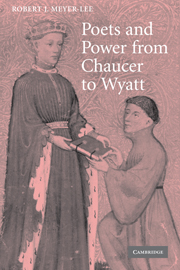Book contents
- Frontmatter
- Contents
- Acknowledgments
- Notes on citations
- Introduction: Laureates and beggars
- PART I BACKGROUNDS
- PART II THE FIRST LANCASTRIAN POETS
- 2 John Lydgate: The Invention of the English Laureate
- 3 Thomas Hoccleve: Beggar Laureate
- PART III FROM LANCASTER TO EARLY TUDOR
- Epilogue: Sir Thomas Wyatt: Anti-laureate
- Notes
- Works cited
- Index
2 - John Lydgate: The Invention of the English Laureate
Published online by Cambridge University Press: 27 October 2009
- Frontmatter
- Contents
- Acknowledgments
- Notes on citations
- Introduction: Laureates and beggars
- PART I BACKGROUNDS
- PART II THE FIRST LANCASTRIAN POETS
- 2 John Lydgate: The Invention of the English Laureate
- 3 Thomas Hoccleve: Beggar Laureate
- PART III FROM LANCASTER TO EARLY TUDOR
- Epilogue: Sir Thomas Wyatt: Anti-laureate
- Notes
- Works cited
- Index
Summary
One is persuaded that his morality is official and impersonal – a system of life which it was his duty to support – and it is perhaps a half understanding of this that has made so many generations believe that he was the first poet laureate, the first salaried moralist among the poets.
(W. B. Yeats)In his seminal Self-Crowned Laureates, Richard Helgerson singles out this remark of Yeats's about Spenser to illustrate the modern antipathy toward laureate poetics. In the anachronistic assumption that Spenser was England's first poet laureate, Yeats detects an alignment with power that to many seems deeply embedded within the Elizabethan poet's authorial ideology. Yet, from a wider perspective, this anachronism is simply a misplaced point of origin. The first “salaried moralist among the poets” – if one counts a royal annuity as a salary – did not postdate Spenser but predated him by nearly 200 years, arriving in the form of John Lydgate, monk of Bury St. Edmunds, 1371–1449. Chaucer and Hoccleve received annuities earlier, but these were prima facie for their work as civil servants rather than as poets. Gower wore a Lancastrian collar but does not seem to have been on the king's payroll other than for his annual grant of two pipes of wine, and no known evidence relates the collar or grant to his literary activity.
- Type
- Chapter
- Information
- Poets and Power from Chaucer to Wyatt , pp. 49 - 87Publisher: Cambridge University PressPrint publication year: 2007



